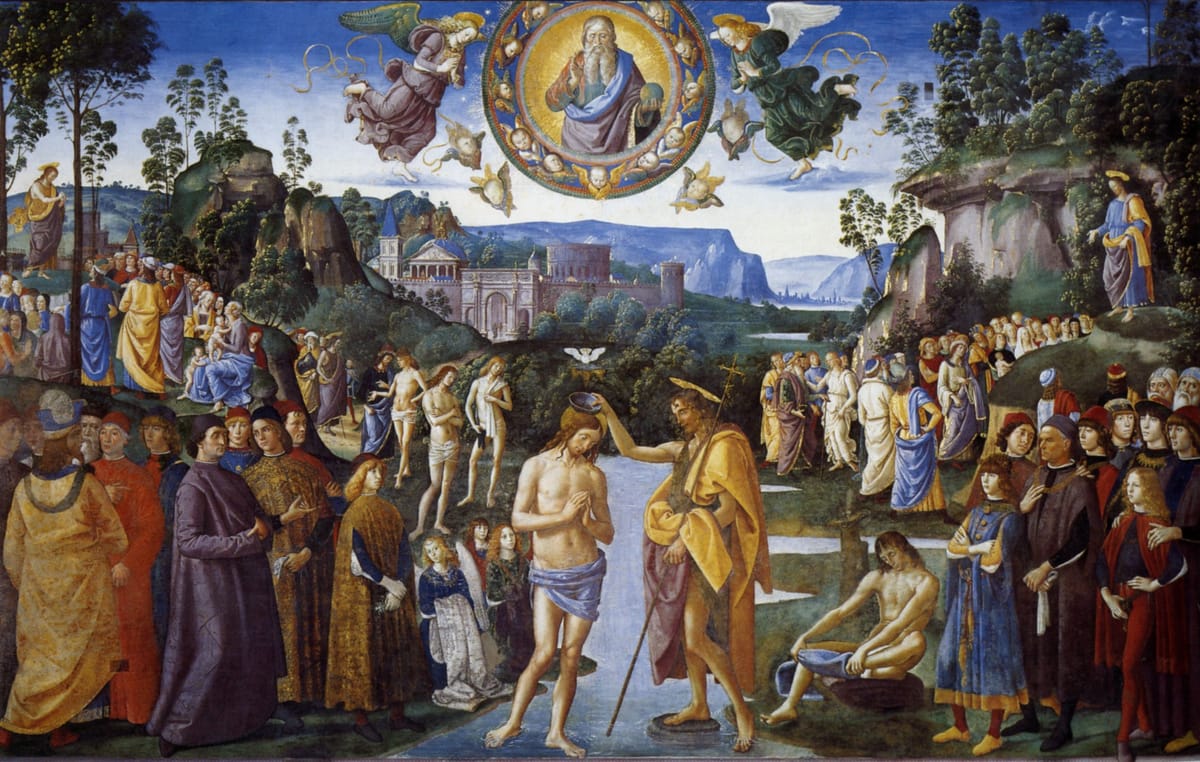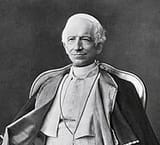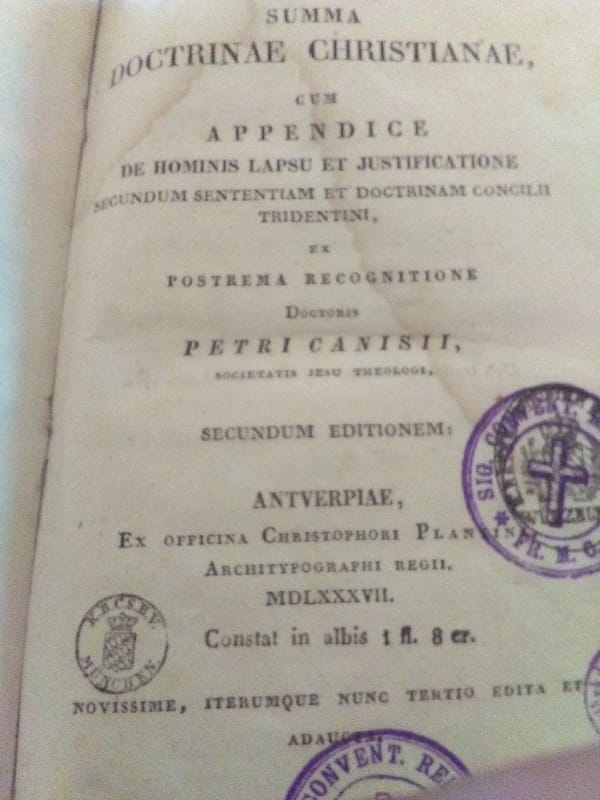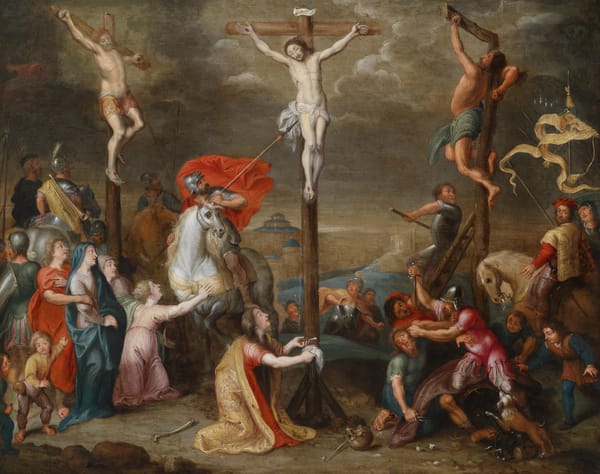The War of Will and Reason and its Relation to the Salvation Dogma

Written by Alexander Lanshe on January 13th, Feast of the Baptism of Our Lord, Anno Domini 2025
In “Desire and Deception: Is the Church Necessary?” by Thomas Hutchinson, he lays out a crucial philosophical thought shift which has had incredible ramifications on the salvation dogma, and the world at large. For the first roughly 1200 years of Church history, Hutchinson asserts that the Neo-platonist view that the will informs the intellect was the dominant view of theologians and the Popes. This was largely due to St. Augustine Christianizing much of Platonic philosophy. This idea was also called Ultrarealism; the notion that the “forms” of Plato exist in the mind of God. The Universals were real and seen as perhaps even more real than the material world. However, in the middle of the 1200's, this underlying philosophy would begin to change. With the advent of St. Albert the Great, and St. Thomas Aquinas popularizing Aristotle in their works, the view that the intellect informs the will became the dominant one. This was termed “Moderate Realism” or Neo-Aristotelianism, and the particulars or individuals became more real than the Universals. The change is subtle but profound. It was reversed from the will informing the intellect to the intellect informing the will.
It is one of the assertions of the author Hutchinson, and after reviewing his book I agree with him, that this foundational change in philosophy has served as one of the hidden foundations as to why so many throughout history from the 1300's to today struggle to accept the truth “outside the Church there is no salvation.”
Why? For this reason: if the intellect informs the will, then only men who have been properly trained and had their intellects intelligently formed and educated can be expected to arrive at the truths of religion. It flips St. Anselm’s classic expression, “I believe so that I may understand” to “I understand so that I may believe.” For St. Anselm, one must believe in order to understand. The belief, or the act of the will, comes first. One had to make the choice to believe and then that belief will lead to understanding.
However, if we flip his classic expression, and I must now understand first (use my intellect) before I can believe (use my will), then what follows from this? Related to the salvation dogma, namely this: that the “invincibly ignorant” pagan on the island is excused from having to be baptized in water and from having explicit faith in Jesus Christ. Why? Because how could he be expected to have those things? The pagan's intellect has never been given the opportunity to take in the sensory data or receive the intellectual input necessary to see if it can understand and therefore believe. Since he was never given this chance to use his intellect to evaluate Christianity, he cannot be expected to be guilty of rejecting Christ, and since God is all good, there must be a way to save this poor creature who does not receive the faith of Christ or water baptism.
A major problem with this Neo-Aristotelian view, is that it seems to not make room for the Providence of God. Why exactly is the pagan dying in ignorance of the Almighty God and His Church? Whose fault is that really? But this question does not seem necessary to ask if the intellect informs the will. It flows logically that if that is true, this pagan cannot be guilty of not receiving faith and baptism, and so, to prevent God from being the author of damnation, many will then say the pagan must be able to be saved without faith and baptism. The Calvinist was comfortable saying the pagan was pre-destined for Hell, but to anyone trying to be Catholic, this path is reprehensible. Regardless, one dogma is sacrificed to save another. This Neo-Aristotelian view makes the world much more deterministic and makes God and His providence more distant. Man becomes a victim of chance in many cases, and is not governed and guided by the all good God in His providence. This however seems at odds with how Scripture and the Early Church portrayed the Providence of God as being all encompassing. Even the great St. Thomas wrote thus eloquently about God's providence:
Since, therefore, as the providence of God is nothing less than the type of the order of things towards an end, as we have said; it necessarily follows that all things, inasmuch as they participate in existence, must likewise be subject to divine providence. - Summa Theologica, Part I, Question 22, Article 2, https://www.newadvent.org/summa/1022.htm#article2
But let us continue. In a similar vein, if a Jew knows of Christ and His claims to be the Son of God, but his intellect cannot understand how or why that is so, how can he be at fault for not believing it? The intellect informs the will right? And since we know God is all good, there must be a way these poor creatures can be saved without faith and baptism. Whereas what did Christ say?
“He that believeth and is baptized shall be saved, he that believeth not shall be condemned” - Mark 16:16.
Hutchinson shows in his book that initially in St. Thomas' day, this change of philosophy did not go unnoticed and it was rejected by no small number of contemporaries of St. Thomas. But after his canonization in 1324, much more respect was given to his theology, and eventually, it became the bedrock of Catholic philosophy. While St. Thomas was not a heretic, and is a canonized saint, this does not mean every single thing taught in the Summa is true. He famously erred on the Immaculate Conception (as did many of his contemporaries, including his best friend St. Bonaventure) in the Summa. Overall, the Summa and St. Thomas' other writings such as the Summa Contra Gentiles are incredible and full of amazing insights and teachings. But being canonized does not mean every single idea one wrote about is true. St. Augustine famously taught that unbaptized infants suffer the pain of sense (hellfire) and such was the respect for the Doctor of Grace that his opinion went virtually unchallenged until St. Anselm in the mid 1000's - almost 700 years of acceptance by all the theologians, and yet, his opinion was at last discarded and is no longer held to be true. All this to say, St. Thomas clearly did not have bad motivations, and was not heretical, but this change in philosophy that was essentially smuggled in with Aristotle has drastic ramifications, as we shall continue to see.
Fast forward to less than 200 years after the canonization of St. Thomas, and this idea that the intellect informs the will had grown much stronger and prevalent. I shall now be clear that what follows is my own opinion on this matter, but please examine the logic of it to see if it is not sound. At this time, Martin Luther begins to rebel against the Church, but he is aided by this Neo-Aristotelian thought, perhaps without even being aware of it. Luther uses the hidden principle of the intellect informing the will to deconstruct Scripture. Instead of “believing (the will) in order to understand (the intellect)”, Luther sets about to “understand (intellect)" the Scriptures "in order to believe (the will)”. Since his intellect could not make sense of faith and works and how they worked together, he created a new way to solve the “problem”. The problem was one of his own invention sadly, and it has had utterly devastating effects across the earth. But how was Luther able to do this and to successfully persuade so many in his day? This is only possible under the philosophical worldview that the intellect informs the will. If one must understand (use the intellect) first in order to believe (an act of the will), then the authority of the Church could be questioned. In fact, Luther did not accept the authority of Scripture either, for he added his own words and sought to delete books and verses from it (not exactly the actions of someone who loves Scripture). However, it is consistent behavior if you believe that the intellect informs the will. If Luther had stuck with St. Anselm’s “I believe so that I may understand” perhaps he would not have rebelled from Christ and the Church.
This example of Luther shows us another major problem of this worldview, viz. that authority can be questioned illegitimately due to the intellect informing the will. If the intellect informs the will, then all authority must be scrutinized to the point that one wonders whether that authority really has any authority after all. This is the hallmark of Protestantism - every man his own Pope, every man guided by the Holy Ghost, except the Pope. The irony. This also applies to the salvation dogma, because if the intellect informs the will, then even if someone is preached the Gospel by a compelling missionary, he still may not be at fault for failing to accept the faith and receive baptism. Because the Gospel simply may not make sense to his intellect, and how can that be his fault?
Jumping ahead to today, this view of the intellect informing the will is the dominant view. After reviewing Hutchinson's book, I am convinced it is one of the key reasons why so many have fallen away from the faith. It also a great deal responsible for why so many claim that God cannot love mankind, because as we saw, this Neo-Aristotelian view makes the world highly deterministic and removes God from it. God becomes so distant. He seems to leave billions in ignorance, millions more in errors and heresies, and untold billions in moral depravity and suffering. Who can serve such a God? This seeming indifference of God is why so many are now materialists, because that is the safe haven one flees to when they feel their Father has abandoned them. The pain of “realizing” their Father does not love them is too great, so they decide to believe that only matter exists, and therefore that unseen Father no longer exists. If men believed in order to understand, they could see God's providence. But if men must understand in order to believe, then God seems to have failed countless people, because he has not satisfied their intellects enough for them to believe in Him. Today, so many believe God is unjust and uncaring (if He exists at all) because of this foundational switch in philosophy of the intellect informing the will vs. the will informing the intellect.
What is the truth however? Does God not love the men of today? Is He not their loving Creator and Father? Yes, God is their Father (inasmuch as He created them) and the Church has always affirmed that God gives sufficient grace to all men for their salvation. The reason for this is soundly Scriptural:
"Who desires all men to be saved and to come to a knowledge of the truth" - 1 Tim 2:4
Yet how can this be true? If the Neo-Aristotelian view is correct, and the intellect informs the will, then how can this Scripture be the truth? It seems impossible for it to be so. Because too many die in ignorance and error and in non-catholic religions. It seems God did not give them the means to save their souls. He did not allow their intellects to be formed properly or to be educated enough to accept Him. Or worse, He never revealed Himself at all. Thus, modern man, faced with these Scriptures, concludes one of two things:
1) That the Scriptures and Catholicism are false, and the God of them is not real. The person then finds themselves taken in by many worldviews to replace Catholicism such as Protestantism, New Age, Buddhism, Agnosticism, Atheism, etc. but most (especially in the West) basically become de facto materialists even if they would not personally identify with the moniker. If they end up believing in any God at all, it is not a God who is concerned with humanity in the least.
2) If they still wish to be Catholic, they become a “liberal Catholic”. They then maintain that it is ok God leaves people in error and lets them die that way, because He saves them despite it. They come to believe that ignorant and unbelieving people don’t actually have to believe in the Christ, the Son of the Living God, by name nor be baptized in water. These get to pretend they are Catholic all the while denying the fundamental mission of the Church:
And he said to them: Go ye into the whole world, and preach the gospel to every creature. He that believeth and is baptized, shall be saved: but he that believeth not shall be condemned. - Mark 16:15-16
What the Scriptures plainly state, and the historical interpretation of them by the Fathers, Popes and Councils of old can be laid aside, because man can now use his intellect to "understand" them all in light of modern thinking or personal experience. The intellect informs the will. Reason triumphs over the will.
What are the ramifications of this view of intellect informing the will? Sadly, this view means that man is grasping in the dark, utterly blind. For if reason has no principle to guide it (namely the will choosing to have faith), it can be convinced of almost anything. Man in his fallen nature is easy to deceive, easy to trick, easy to fool, and man’s pride goeth before his fall. His intellect can thus be formed by Public education, Television, the Media, Liberal Universities, etc. All the while, Satan does not care which of these two paths a man takes: agnosticism and materialism or liberal Catholicism. Both will damn the soul and both serve their purpose in leading more souls away from Christ. Both are equally anti-Catholic and anti-truth.
What is the answer to this? Is man really blind without faith? Again, we turn to Scripture: Jesus Christ revealed,
“I am the light of the world: he that followeth me, walketh not in darkness, but shall have the light of life.” - John 8:12
The Greek word used for “followeth” is akolouthōn which means: I accompany, attend, follow. It is derived from the Greek word "akolouthos," meaning "a follower" or "companion." If we follow Him, Jesus Christ, we have the light of life. To follow Christ is an act of the will. It is a choice. It can be done with zero intellectual ability or training. We can believe He is the Christ, the Son of the Living God, first, and then use our intellect to understand what we can. In fact, profound intellects are very often a barrier to accepting Christ due to the pride that often comes with it.
Let us look at a few historical examples which prove that the intellect informing the will is not the path that leads to God. Satan had the greatest intellect of heaven, and it profited him nothing because his will was against His God. He sought to understand first in order to believe. Since he could not understand how a creature as magnificent as himself would have to serve the Son of God in the flesh, he rebelled. Whereas St. Michael, whose heart loved God, cast Satan down into Hell and would not abandon his Creator. If reason is not guided by the light of faith (which is believed first in the will; indeed, in order to "guide" something, the guide must go before the one being guided) then reason cannot see. It is blind.
As another example, Solomon had all wisdom and understanding (intellect) but his heart was turned from God by his sins of sexual lust. His heart (will) loved his wives and concubines more than He loved God, and he fell away. His selfish love for these women even led him to allow them to practice idolatry. He did not have an intellect problem, he had a heart problem. A problem of the will. When the angels appeared on Christmas morning they said,
“Glory to God in the Highest and on earth peace to men of good will” - Luke 2:14
Not “Peace to men of good intellect”. The will comes first.
The results of this philosophy on the salvation dogma today means that many who claim to be Catholic are deceived into denying the truth of the dogma “outside the Church there is no salvation”. They cannot see how that is compatible with the mercy and love of God for all men. It seems too cruel, so they reject it. But the dogmas are clear on this point. The saints and Fathers cry out with a loud voice in unison throughout the ages that no man is saved outside the Church, just as no man was saved outside the Ark of Noah. Scripture states that exact thing plainly in St. Peter’s first epistle. But, not knowing that the very way they think has been subverted, these men try to find ways to show how these clear teachings do not actually mean what they plainly state. The intellect is used to reinvent and reinterpret them to basically empty them of the original meaning. As Pope Pius XII said, in Humani Generis, #6:
“Some reduce to a meaningless formula the necessity of belonging to the true Church in order to gain eternal salvation."
But why is this clear denial of the dogmas and Scripture so persuasive? Simply because the logic employed by men today using this Moderate Realism or Neo-aristotelian thought, is that the arguments they make are valid. If their starting premises were correct, their arguments would be sound, because the conclusions they reach flow validly from their premises. Deceived by this, they believe the argument must be correct. But not all valid arguments are sound. As a silly example, I can say: All dogs are cats. A tiger is a cat. Therefore a tiger is a dog. That’s a valid argument. But it is unsound - viz. Untrue. But if the premises were true, the argument would sound.
What premise of theirs is false? As we have shown, that the intellect informs the will. This is the unseen problem. The intellect does not inform the will, the will informs the intellect. The intellect is directed and guided by the will as to what exactly it is to intellectualize about. The motivation and force that drives the intellect is the will. If the will/heart be evil, the intellect will be used for evil. And more importantly and to the point: A corrupt heart cannot be changed by the intellect. The divine revelation will not take root in a corrupt heart unless the heart/will changes towards desiring the good and the true and the beautiful. If the will does not say to the intellect, "No more of this evil! We are going to pursue the truth in righteousness", then the intellect is powerless to change the man. Again, Solomon and Satan had no issues of intellect. Their problem resided in the will. How many examples such as this could be sighted? King Henry VIII was given the honor of "Defender of the Faith" before his schism. What led to his schism? A bad will. A bad heart. He had all the intellect and knowledge he needed to die a good Catholic, but his heart was corrupted by lust and worldly concerns. How many examples can you think of in your own life where this truth has played out?
This false ordering then is what causes men to make false premises part of their argument. Again, many of their arguments are valid, and being deceived by that, they believe the arguments must be true. But it does not follow. Due to these false premises, many believe that a man needs to understand Catholicism first before he can convert or accept the faith. This is false. Again, if that man's will is not inclined to accept truth, then he will not accept it. Modern man scoffs at this idea. It places too much responsibility for salvation on man, they say. And yet without this change in philosophy, no true faith can be obtained. Because if one only believes something when one can understand it first, then one ultimately believes in one’s own power of reasoning. This is why so many skeptics cannot accept things like the Virgin Birth, or the Transubstantiation of the Eucharist, or the Resurrection. It simply eludes their powers of understanding, so they cannot accept it. This same skepticism is carried into the salvation dogma by many would-be Catholics due to this issue of intellect informing the will.
The other premise that is false which is a result of this worldview is that man acts first in his pursuit of salvation. His intellect sorts through all the religious questions and data first, and then he assents to which one makes the most sense to him. So if a man never has the opportunity to sort through Christianity (the pagan on the island) or he has the opportunity but the Gospel doesn’t make as much sense to him as his own religion (someone raised a Jew or a Muslim) then these men cannot be faulted for not believing in Christ. The odds were basically against them. If their premise of intellect informing the will was correct, I would totally agree with them. That is a logical outcome of such a worldview. However, the premise is false. Because God does give sufficient grace for the pagan on an island, and the Jew or Muslim in the Middle-East to arrive at a knowledge of the truth and convert to Catholicism. We have already sighted the Scriptures and St. Thomas to show that God's providence extends to all things, but we shall offer one more citation from Scripture to prove that God acts first, not man, and that the will informs the intellect. Let us look at the Parable of the Sower:
"Hear you therefore the parable of the sower. When any one heareth the word of the kingdom, and understandeth it not, there cometh the wicked one, and catcheth away that which was sown in his heart: this is he that received the seed by the way side. And he that received the seed upon stony ground, is he that heareth the word, and immediately receiveth it with joy. Yet hath he not root in himself, but is only for a time: and when there ariseth tribulation and persecution because of the word, he is presently scandalized. And he that received the seed among thorns, is he that heareth the word, and the care of this world and the deceitfulness of riches choketh up the word, and he becometh fruitless. But he that received the seed upon good ground, is he that heareth the word, and understandeth, and beareth fruit, and yieldeth the one an hundredfold, and another sixty, and another thirty." - Matthew 13:18-23
The Sower goes forth to sow his seed. Who is the sower? God. Who are the men? The various grounds the seeds are sown upon. The will, or heart, is likened to the soil and ground. Only one type of ground is fertile and able to receive the seeds and bear abundant fruit, the seed that fell upon good ground. This good ground, is good will. God acts first by sowing the seed, the men of good will have good ground, and because the ground is good, they are able to understand (intellect) the word and then bear fruit accordingly. The way side, the stony ground, and the thorns all represent ground (wills) that are not good. For their respective reasons, they do not persevere and bear fruit for the sower. The meaning is clear. If the ground (will) is bad, then the seeds will not grow (intellect) and bear fruit. The will informs the intellect.
It cannot be doubted therefore that God brings (sows) the Catholic faith and baptism to all men of good will either in ordinary or even miraculous and extraordinary ways. History is replete with miraculous conversions, even people being bilocated to teach the faith to Indians (Sr. Ven. Mary of Agreda) and other nations who had never had the Gospel preached to them. Men were brought back from the dead just so they could be baptized (St. Patrick and St. Francis Xavier performed two famous examples of this).
Pentecost was an “ordinary” way. God timed the advent of Pentecost to coincide with the visitation of Jews from all over the Hellenic world at the time in Jerusalem so that once they heard the Apostles preach and were baptized, they brought their new faith back to all their respective lands, and thus expedited the spread of the Gospel. The determinist or Neo-Aristotelian would say “what a coincidence” the Neo-platonist or Anselm-ite would say, “look at God’s providence.”
Finally, in conclusion there are only three possible worldviews one can take on the salvation dogma in light of what has been said. One of them is true, the others are false. One of them is the will informs the intellect, and the other two exist as explanations due to the belief that the intellect informs the will. They are as follows:
1) That God can and does bring explicit faith in His Son and sacramental water baptism to all men of good will before their death because those things are absolutely necessary and essential for them to be able to obtain the Beatific Vision. In this view, God's providence is given to all men, and all whose wills are bent on good, receive what is needed for them to be saved. God in this view is all good, all knowing, and all powerful.
2) God does not bring faith and baptism to all men of good will despite their actual and true need for it in order to obtain the Beatific Vision. In this view, God can be all knowing, and all powerful, but He cannot be all good. Because He sees men of good will who need His help and He deliberately chooses to let them be damned. God is now evil, and this God is in fact the Devil, and not the One, True, God. Again, this is the Calvinist god of predestining souls for Hell.
3) God does not bring faith and baptism to all men of good will because those two things are not actually necessary for every single human being to personally receive in order to obtain the Beatific Vision. Because the intellect informs the will, not all men can be expected to receive faith and baptism, so God saves them without those things.
Which of these three is the truth of salvation? We shall let Scripture, The Holy Ghost, have the last word:
"Because Christ also died once for our sins, the just for the unjust: that he might offer us to God, being put to death indeed in the flesh, but enlivened in the spirit, In which also coming he preached to those spirits that were in prison: Which had been some time incredulous, when they waited for the patience of God in the days of Noe, when the ark was a building: wherein a few, that is, eight souls, were saved by water. Whereunto baptism being of the like form, now saveth you also: not the putting away of the filth of the flesh, but the examination of a good conscience towards God by the resurrection of Jesus Christ. Who is on the right hand of God, swallowing down death, that we might be made heirs of life everlasting: being gone into heaven, the angels and powers and virtues being made subject to him". - 1 Peter 3:18-22




